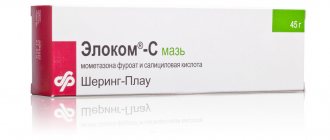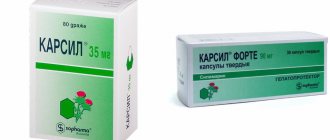Pharmacological properties of the drug Sorbifer Durules
Sorbifer Durules is a combined preparation of iron and ascorbic acid that has an antianemic effect in iron deficiency anemia. Ferrous sulfate replenishes iron deficiency in the body. Ascorbic acid improves its absorption in the digestive tract. The prolonged release of ferrous iron ions from Sorbifer Durules tablets prevents an undesirable increase in the content of iron ions in the digestive tract and prevents their irritating effect on the mucous membrane. After taking the drug, iron absorption occurs rather slowly, since as the Sorbifer Durules tablet passes through the digestive tract, the release of iron ions from the permeable matrix occurs within 6 hours.
Instructions for use SORBIFER™ DURULES® (SORBIFER™ DURULES®)
Sorbifer™ Durules® should not be combined with the following drugs:
- ciprofloxacin
: when used together, the absorption of ciprofloxacin is reduced by 50%, thus there is a danger that its plasma concentration will not reach a therapeutic level; - levofloxacin
: when used together, the absorption of levofloxacin is reduced; - moxifloxacin
: when used together, the bioavailability of moxifloxacin is reduced by 40%. When using moxifloxacin and Sorbifer™ Durules® simultaneously, the maximum possible time interval of at least 6 hours should be maintained between taking these drugs; - norfloxacin
: when used together, the absorption of norfloxacin is reduced by approximately 75%; - ofloxacin
: when used together, the absorption of ofloxacin is reduced by approximately 30%; - mycophenolate mofetil
: a sharp decrease in absorption of mycophenolate mofetil by 90% was observed when combined with drugs containing iron. - they form complexes with iron salts, thus impairing each other's absorption.
- When used concomitantly with captopril, its area under the concentration-time curve decreases by an average of 37%, probably due to a chemical reaction in the gastrointestinal tract.
Combinations to avoid
— Iron (salts) (parenteral route of administration)
Lipotymia, even shock, is possible, which is explained by the rapid release of iron from its complex form and saturation of transferrin.
Therefore, the combined use of oral and parenteral iron supplements should be avoided; the same goes for repeated blood transfusions.
Combinations to Consider
— Acetohydroxamic acid
Reduced absorption of both drugs as a result of complexation.
Combinations to be used with precautions
— Bisphosphonates
Reduced absorption of bisphosphonates due to the formation of poorly absorbable complexes with iron.
It is recommended to maintain an interval between taking iron salts and bisphosphonates (from 30 minutes to 2 hours or more, if possible, depending on the bisphosphonate).
— Entacapone
Reduced absorption of entacapone and iron by chelation with entacapone.
It is recommended to maintain an interval between the intake of iron salts and entacapone (if possible, more than 2 hours).
— Strontium
It is recommended to maintain an interval between taking iron and strontium salts (if possible, more than 2 hours).
— Proton pump inhibitors
May reduce absorption of oral iron. Therefore, dose adjustment or replacement with intravenous iron may be required.
— Nonsteroidal anti-inflammatory drugs (eg, salicylates and phenylbutazone)
When administered orally, an irritating effect on the mucous membrane of the gastrointestinal tract may occur.
— Dimercaprol
Forms a toxic complex with iron and should not be used simultaneously with iron supplements.
— Cholestyramine
Iron absorption is impaired.
The potential interactions mentioned above can be reduced by maintaining at least a 2-hour interval between doses of each drug.
Oral administration of ferrous sulfate preparations may result in a false-positive stool occult blood test.
When using Sorbifer™ Durules® together with the following drugs, it may be necessary to change their dose.
The maximum possible time interval of at least 2-3 hours should be maintained between taking Sorbifer™ Durules® and any of these drugs:
- — Dietary supplements containing calcium or magnesium, and antacids containing aluminum, calcium or magnesium
:
— Captopril
:
— Zinc:
with simultaneous use, the absorption of zinc salts decreases.
— Clodronate and risendronate
:
- in vitro
studies have shown that preparations containing iron form a complex with clodronate.
Although in vivo
have not been conducted, it can be assumed that the absorption of clodronate is reduced when used together.
— Deferoxamine
:
- When used together, the absorption of both deferoxamine and iron is reduced due to the formation of complexes.
— Levodopa, carbidopa
:
- when ferrous sulfate is co-administered with levodopa and carbidopa - probably due to the formation of complexes - the bioavailability of levodopa in healthy volunteers is reduced by 50%, and carbidopa by 75%.
— Methyldopa (levorotatory)
:
- When iron salts (iron sulfate and gluconate) are used together with methyldopa - probably due to the formation of chelate complexes - the bioavailability of methyldopa decreases, which may worsen its hypotensive effect.
— Penicillamine
:
- when penicillamine is used together with iron salts - probably due to the formation of chelate complexes - the absorption of both penicillamine and iron salts is reduced.
— Alendronate
:
- in an in vitro
, preparations containing iron formed complexes with alendronate, reducing the absorption of the latter.
In vivo
results are not available.
— Tetracycline
:
- when used together, the absorption of both tetracycline and iron is reduced, therefore, when used in combination, the maximum possible time interval should be maintained, which is at least 3 hours between doses. The use of iron-containing drugs worsens the enterohepatic cycle of doxycycline, both when taken orally and when administered intravenously, so the combined use of these drugs should be avoided.
— Thyroid hormones
:
- When iron-containing drugs and thyroxine are used together, the absorption of the latter may decrease, which can lead to the failure of replacement therapy.
— Cimetidine
:
- when used together with Sorbifer™ Durules® with cimetidine, the decrease in gastric acidity caused by cimetidine reduces iron absorption. Therefore, when used in combination, the maximum possible time interval should be maintained, which is at least 2 hours.
— Chloramphenicol
:
- The effect of treatment with iron supplements appears later. The formation of red blood cells is suppressed and hemoglobin levels decrease.
When Sorbifer™ Durules® is used with tea, coffee, eggs, dairy products, wholemeal bread, cereals or foods rich in fiber, iron absorption may be reduced.
Interactions associated with ascorbic acid
Increases the concentration of salicylates in the blood (increases the risk of developing crystalluria), ethinyl estradiol, benzylpenicillin, and tetracyclines
.
Reduces the concentration of oral contraceptives
.
Increases the activity of norepinephrine
.
Reduces the anticoagulant effect of coumarin derivatives, heparin
.
Improves the absorption of iron preparations
, as well as iron from food (due to the conversion of ferric iron to divalent iron).
Increases the overall clearance of ethyl alcohol
.
May affect the effectiveness of disulfiram
in the treatment of chronic alcoholism.
The simultaneous use of ascorbic acid and deferox
does not increase the excretion of iron.
Acetylsalicylic acid, oral contraceptives, fresh juices and alkaline drinks
reduce the absorption and assimilation of ascorbic acid.
Ascorbic acid increases renal excretion of amphetamine
.
Plasma ascorbate concentration decreases with smoking
and taking
oral contraceptives
.
Concomitant use of acetylsalicylic acid
and ascorbic acid may interfere with the absorption of ascorbic acid. The renal excretion of salicylate is not affected and does not lead to a decrease in the anti-inflammatory effect of acetylsalicylic acid.
Concomitant use of aluminum-containing antacids
may increase urinary excretion of aluminum. The simultaneous administration of antacids and ascorbic acid is not recommended, especially in patients with renal failure.
Combined use with amygdalin
(alternative therapy) may cause cyanide toxicity.
Concomitant use of ascorbic acid with deferoxamine
increases urinary iron excretion and may lead to cases of cardiomyopathy and heart failure in patients with idiopathic hemochromatosis and thalassemia receiving deferoxamine who are subsequently given ascorbic acid. Ascorbic acid should be used with caution in these patients and cardiac function monitored.
Ascorbic acid may interfere with the biochemical determination of creatinine, uric acid and glucose in blood and urine samples.
Use of the drug Sorbifer Durules
Average doses for adults and adolescents over 12 years of age: 1 tablet 2 times a day (morning and evening) 30 minutes before meals; Swallow the tablet whole and wash it down with plenty of water. If side effects develop, the dose should be reduced by 50% (1 tablet per day). For anemia in the first and second trimesters of pregnancy, 1 tablet per day is prescribed, in the third trimester, as well as during breastfeeding - 1 tablet 2 times a day. The duration of treatment is determined individually, taking into account the iron content in the blood plasma. When hemoglobin is normalized, therapy should be continued for about 2 more months, until the iron depot in the body is saturated. For severe clinical manifestations of iron deficiency, the duration of treatment is 3–6 months.
Sorbifer Durules
Sorbifer Durules should not be combined with the following drugs:
— ciprofloxacin
: when used together, the absorption of ciprofloxacin is reduced by 50%, thus there is a danger that its plasma concentration will not reach a therapeutic level;
— levofloxacin
: when used together, the absorption of levofloxacin is reduced;
— moxifloxacin
: When used together, the bioavailability of moxifloxacin is reduced by 40%. When using moxifloxacin and Sorbifer Durules simultaneously, the maximum possible time interval of at least 6 hours should be maintained between taking these drugs;
— norfloxacin
: when used together, the absorption of norfloxacin is reduced by approximately 75%;
— ofloxacin
: when used together, the absorption of ofloxacin is reduced by approximately 30%;
— mycophenolate mofetil:
a sharp decrease in absorption of mycophenolate mofetil by 90% was observed when used together with drugs containing iron.
When using Sorbifer Durules together with the following drugs, it may be necessary to change their dose.
The maximum possible interval of at least 2 hours should be maintained between taking Sorbifer Durules and any of these drugs:
- Dietary supplements containing calcium or magnesium, as well as antacids containing aluminum, calcium or magnesium:
they form complexes with iron salts, thus impairing each other’s absorption;
— Captopril
: When used concomitantly with captopril, its area under the concentration-time curve (AUC) decreases by an average of 37%, probably due to a chemical reaction in the gastrointestinal tract;
— Zinc
: with simultaneous use, the absorption of zinc salts decreases;
— Clodronate
In vitro
studies have shown that preparations containing iron form a complex with clodronate.
Although in vivo
have not been conducted, it can be assumed that the absorption of clodronate is reduced when used together;
— Deferoxamine
: when used together, the absorption of both deferoxamine and iron is reduced due to the formation of complexes;
— Levodopa and carbidopa:
When ferrous sulfate is co-administered with levodopa and carbidopa, probably due to the formation of complexes, the bioavailability of levodopa in healthy volunteers is reduced by 50%. and carbidopas - by 75%;
— Methyldopa (levorotatory)
: when iron salts (iron sulfate and gluconate) are used together with methyldopa - probably due to the formation of chelate complexes - the bioavailability of methyldopa decreases, which may worsen its antihypertensive effect;
— Penicillamine
: when penicillamine is used together with iron salts - probably due to the formation of chelate complexes - absorption as penicillamine. so iron salts decrease;
— Alendronate
: In an
in vitro
, preparations containing iron formed complexes with alendronate, reducing the absorption of the latter.
In vivo
results are not available;
— Risedronate
: In an in vitro study, iron containing preparations formed complexes with risedronate.
Although this interaction has not been studied in vivo
, it is expected that the absorption of risedronate will be decreased if administered together;
— Tetracycline
: When used together, the absorption of tetracycline is reduced, therefore, when used in combination, the maximum possible time interval should be maintained, which is at least 3 hours between doses. The use of iron-containing drugs worsens the enterohepatic cycle of doxycycline, both when taken orally and when administered intravenously, so the combined use of these drugs should be avoided;
— Thyroid hormones:
when using iron-containing drugs and thyroxine together, the absorption of the latter may decrease, which can lead to the failure of replacement therapy;
— Cimetidine
: When used together with Sorbifer Durules with cimetidine, the decrease in gastric acidity caused by cimetidine reduces the absorption of iron.
When using Sorbifer Durules with tea, coffee, eggs, dairy products, wholemeal bread, cereals or foods rich in fiber, iron absorption may be reduced.
Other interactions:
— With iron supplements and other drugs that contain iron:
possible accumulation of iron in the liver; the likelihood of iron overdose increases;
— With pancreatin, cholestyramine:
there is a decrease in iron absorption from the gastrointestinal tract;
— With methyldioxyphenylalanine:
reduction in absorption of methyldioxyphenylalanine in the oral cavity by 61-73%;
— With
tocopherol
: the activity of both drugs decreases;
— With glucocorticosteroids:
possible increased stimulation of erythropoiesis;
— With allopurinol:
possible accumulation of iron in the liver;
— With acetohydroxamic acid:
the activity of both drugs decreases;
— With chloramphenicol:
The effectiveness of iron supplements decreases. The formation of red blood cells is suppressed and the Hb concentration decreases;
— With ethanol:
absorption and the risk of toxic complications increases;
— With
etidronic acid
: the activity of etidronic acid decreases. It should be taken no earlier than 2 hours after taking Sorbifer Durules.
Interactions associated with ascorbic acid
Increases the concentration of salicylates in the blood (increases the risk of developing crystalluria), ethinyl estradiol, benzine penicillin and tetracyclines.
Reduces the concentration of oral contraceptives. Acetylsalicylic acid and oral contraceptives also reduce the absorption and absorption of ascorbic acid.
Increases the activity of norepinephrine.
Reduces the anticoagulant effect of coumarin derivatives and heparin.
Improves the absorption of iron preparations in the intestines, as well as iron from food (due to the transfer of Fe (III)↔Fe (II)).
Increases the overall clearance of ethyl alcohol. May affect the effectiveness of disulfiram in the treatment of chronic alcoholism.
The simultaneous use of ascorbic acid and deferoxamine increases iron excretion.
Food and Beverage Interactions
When using Sorbifer Durules with tea, coffee, eggs, dairy products, wholemeal bread, cereals or foods rich in fiber, iron absorption may be reduced.
Fresh juices and alkaline drinks reduce the absorption and assimilation of ascorbic acid. The time interval between taking the drug and consuming these products should be at least 2 hours.


